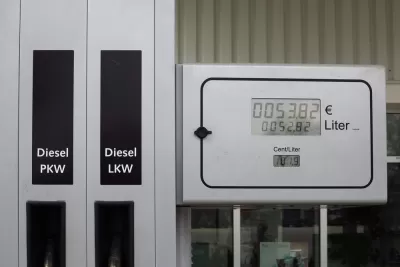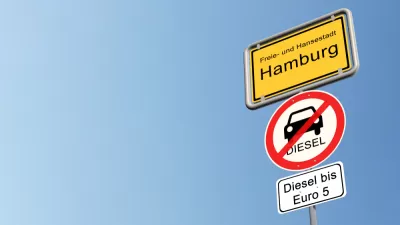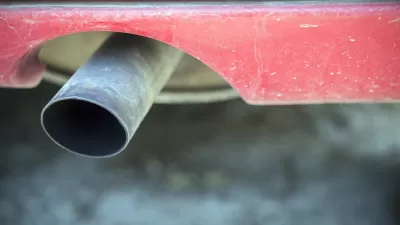Unlike banning sales of new internal combustion vehicles at a future date, the German court ruling applies to the operation of older, diesel-powered cars in the country's most polluted cities. It's up to the cities, though, to enact the bans.

"The days of flooding the inner cities with poisonous diesel emissions are over,” said Jürgen Resch, managing director of Deutsche Umwelthilfe. “These vehicles have no place in our cities anymore.”
The environmental and consumer rights organization had initiated the lawsuit, reports Melissa Eddy for The New York Times on the Feb. 27 ruling. The court case pitted environmentalists against auto manufacturers, as the photo taken outside the courthouse in Leipzig, Germany on Feb. 22 shows.
Frustrated with the lack of progress in improving air quality in about 70 of the country’s most polluted cities, the group brought lawsuits against several local governments, demanding that they uphold the air quality standards set by the European Union. In some instances, cities found that the only way to ensure those standards were met involved banning certain vehicles — mostly older diesel models — from city streets.
“Limited bans for certain diesel cars are within the law,” the court said in its ruling, as one way to allow cities to meet the limits on the emissions of nitrogen oxide established by the European Union in 2010.
Age of the vehicle is critical to emissions output
The court further found that when emissions exceeded the allowed limits, banning all vehicles with diesel motors older than those approved in 2014 and gasoline-burning engines older than those approved in 2001 was the only way for the municipal authorities to ensure air quality.
The ruling called for “proportionality,” stipulating that only older models with the highest emissions could be subject to such bans...
Resch of Deutsche Umwelthilfe stated that he expected the ruling to take effect this fall in two of the nation's most polluted cities, Düsseldorf and Stuttgart.
Eddy also writes about Volkswagen's "dieselgate" scandal, as it was called in the U.S., exposed in September 2015 that has led to multi-billion dollar settlements.
Katrin Bennhold, also of the Times, reports on the court ruling as well, with a focus on how it affects German's auto industry and Stuttgart, home of Daimler AG, in particular. ”Industry leaders were stunned," she writes.
“It is the latest wake-up call for the German auto industry and German politicians,” said Christoph Bals, policy director of Germanwatch, an advocacy and research group for clean energy. “And this time it might actually force them to change their ways.
Chancellor Angela Merkel has sided with industry. “We will use all our power to prevent such bans,” she told Parliament ahead of elections last September.
Welcome to the club
German cities now can join others that have enacted partial diesel car bans, including Milan and Delhi. Also on Feb. 27, Mayor Virginia Raggi of Rome announced "plans to ban diesel cars from the [city] centre by 2024," according to Reuters. Unlike the German court ruling, the ban will apply to all diesel cars regardless of age.
Hat tip to MTC-ABAG Library.
FULL STORY: German Court Rules Cities Can Ban Vehicles to Tackle Air Pollution

Planetizen Federal Action Tracker
A weekly monitor of how Trump’s orders and actions are impacting planners and planning in America.

Restaurant Patios Were a Pandemic Win — Why Were They so Hard to Keep?
Social distancing requirements and changes in travel patterns prompted cities to pilot new uses for street and sidewalk space. Then it got complicated.

Map: Where Senate Republicans Want to Sell Your Public Lands
For public land advocates, the Senate Republicans’ proposal to sell millions of acres of public land in the West is “the biggest fight of their careers.”

Maui's Vacation Rental Debate Turns Ugly
Verbal attacks, misinformation campaigns and fistfights plague a high-stakes debate to convert thousands of vacation rentals into long-term housing.

San Francisco Suspends Traffic Calming Amidst Record Deaths
Citing “a challenging fiscal landscape,” the city will cease the program on the heels of 42 traffic deaths, including 24 pedestrians.

California Homeless Arrests, Citations Spike After Ruling
An investigation reveals that anti-homeless actions increased up to 500% after Grants Pass v. Johnson — even in cities claiming no policy change.
Urban Design for Planners 1: Software Tools
This six-course series explores essential urban design concepts using open source software and equips planners with the tools they need to participate fully in the urban design process.
Planning for Universal Design
Learn the tools for implementing Universal Design in planning regulations.
Heyer Gruel & Associates PA
JM Goldson LLC
Custer County Colorado
City of Camden Redevelopment Agency
City of Astoria
Transportation Research & Education Center (TREC) at Portland State University
Camden Redevelopment Agency
City of Claremont
Municipality of Princeton (NJ)





























